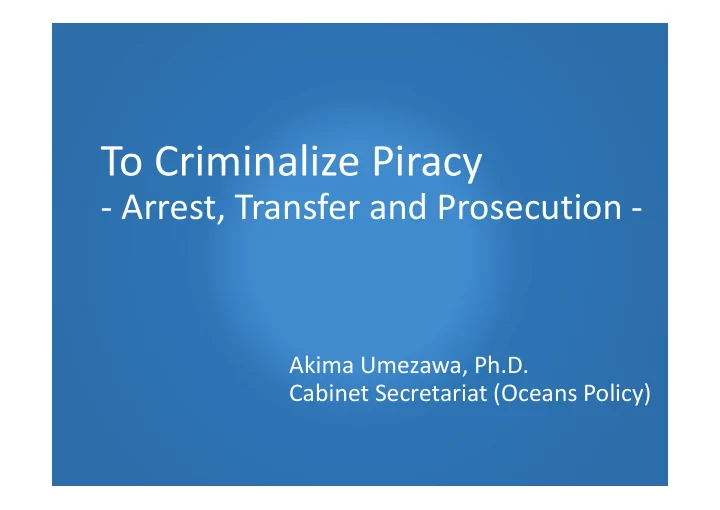

To Criminalize Piracy - Arrest, Transfer and Prosecution - Akima Umezawa, Ph.D. Cabinet Secretariat (Oceans Policy)
Guanabara Case (Number 2012 (wa) No.77) • Pirate: Foreign nationals • Attacked vessel: Foreign flag • Crews nationality: All non-Japanese • Area: High seas • Date: March 5, 2011 • Oil tanker operated by Japanese company
No. Year Development Piracy 2006 22 2007 Act on Ocean Policy 51 UNSC Resolutions 1816, 1838 and 1846 2008 111 Plan of Ocean Policy 2009 Japan Piracy Act 218
Before enacting the Piracy Act • Japan Coast Guard Act authorizes to exercise enforcement jurisdiction of Japan’s laws and regulations for ensuring safety and order at sea. • Penal Code is applicable, on the high seas, to a crime committed on board the Japanese flag vessel,* to a crime committed by a Japanese national,** or If a victim is a Japanese national.** *: territorial principle **: nationality principle
Japan Piracy Act (2009) – defines piracy by making reference to the UNCLOS Article 101, – criminalizes piracy on the principle of universal jurisdiction, and – authorizes the Japan Maritime Self- Defense Force to conduct anti-piracy operations .
Guanabara Case (2011) Mar 5 Four Somali pirates attempted forcibly. Mar 6 US Navy detained them. Mar 10 Tokyo District Court issued the arrest warrant. Mar 11 Japan Coast Guard (JCG) exercised the arrest warrant. Mar 12 JCG transferred the suspects from Djibouti. Mar 13 JCG referred the suspects to the public prosecutor . 2013 Definitive judgments delivered through the Appeal Courts - 2014 Ruling and the Supreme Court Decision.
Code of Criminal Procedure • the judicial police officer …. …. shall inform of the facts of suspected crime …. …. shall refer the suspects to the public prosecutor within 48 hrs of the arrest …. Mar 6 US Navy detained them. Mar 11 Japan Coast Guard (JCG) exercised the arrest warrant. Mar 13 JCG referred the suspects to the public prosecutor .
The judge found that: • officers had made every effort to convey their intention to arrest and protect the rights of suspects. • there had been no undue delay, which could have made the prosecution invalid.
Issues raised • Distance and Resources (1 day flight between Tokyo - Djibouti) • Human Rights (rights accorded to suspects)
At the 171 st Diet Session in 2009, the Government explained: …. but in case of minor crime, bringing them to Japan for the criminal proceeding would be great deal of complexity in terms of resources, …. we would take decision on a basis of case by case.
Memorandum (2014) between Japan and Seychelles on the conditions of transfer of suspected pirates and seized property to, and their treatment in Seychelles
• Japan demonstrated its commitment, enacting a law to criminalize piracy, and exercising the universal jurisdiction for arrest, transfer and prosecution of pirates. • It also raised the issues in terms of distance, resources and human rights, all of which require international cooperation.
Recommend
More recommend